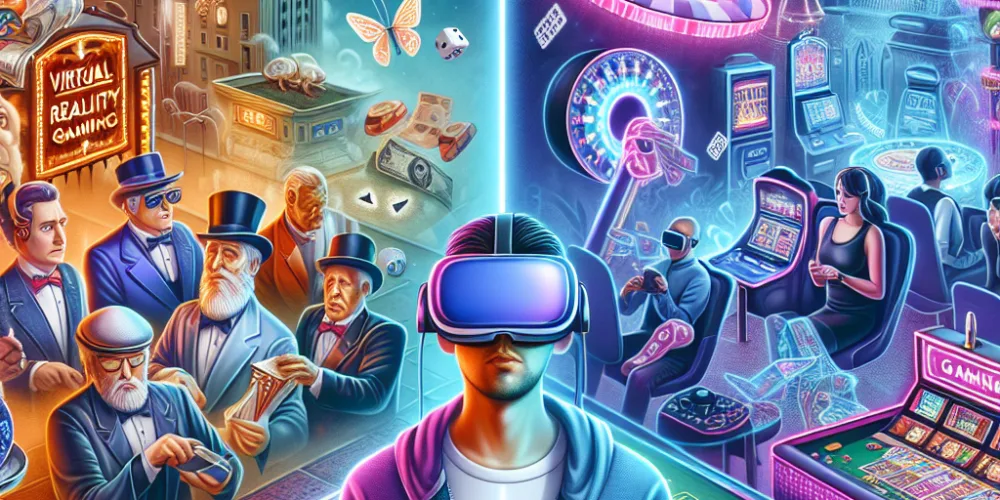In the ever-evolving world of gaming, the advent of virtual reality (VR) technology has begun to reshape how enthusiasts engage with casino experiences. Virtual reality casinos are no longer a futuristic fantasy but a present-day reality, offering players immersive environments that mimic the bustling atmosphere of traditional brick-and-mortar casinos. This technological transformation is not just enhancing the user experience but also expanding the market for developers and businesses involved in the casino and gaming industry.
Virtual reality casinos utilize VR headsets to transport players into a fully interactive, digital casino floor. The experience is overwhelmingly realistic, allowing players to roam around the virtual space, interact with other players, and engage in a variety of games such as slots, roulette, blackjack, and poker. This shift is attracting a new demographic of players who seek a comprehensive gaming experience from the comfort of their homes.
Why VR Casinos Are Gaining Popularity
The appeal of virtual reality casinos lies in their ability to provide a detailed and engaging environment. Enhanced graphics and real-time interactions contribute to the allure, turning what once was a simple game into an elaborate social event. Players can read body language, engage in live conversations, and observe real-time reactions, which enhances the authenticity of the experience and can improve strategic gameplay in games like poker.
Moreover, VR casinos are accessible. With the global spread of VR devices and the improvement in internet technology, more people can now enjoy an advanced gaming experience. This accessibility is crucial in a world that demands more digital and remote entertainment options.
Economic Implications
The economic implications of VR casinos are significant. They offer a lucrative opportunity for casino operators and software developers, who are eager to tap into the growing VR market, predicted to reach substantial growth by 2028. This expansion is fueled by increasing VR sales, with units like Oculus Rift, HTC Vive, and Sony PlayStation VR leading the market.
Beyond hardware, software developers are crucial in this ecosystem, as the demand for new and innovative VR casino games increases. The development of these games requires a new set of skills and knowledge, including 3D modeling and real-time multiplayer game design, creating a slew of job opportunities and driving economic growth in the technology and gaming sectors.
Regulatory Challenges and the Path Forward
As with any emerging technology, VR casinos face regulatory scrutiny. The integration of VR technology in gambling raises questions about security, privacy, and ethical gaming practices. Regulatory bodies are tasked with developing new frameworks to accommodate these innovations while ensuring they do not encourage gambling addiction or misuse.
Governments and regulatory authorities are beginning to work alongside technology developers to establish clear guidelines and secure environments for players. This includes implementing age restrictions, privacy regulations, and fairness algorithms to ensure that the virtual play remains responsible and transparent.
The Social Aspect of VR Casinos
Virtual reality casinos are also redefining social interactions within the gaming community. They provide a platform for socialization and interaction that rivals social media networks. Players can meet new people, join games together, and even form virtual friendships. This social component is crucial as it adds significant value to the gaming experience, making it about more than just gambling.
Conclusion
Virtual reality casinos are transforming the casino industry by providing a dynamic and engaging way to play and socially interact in a digital world. As technology continues to develop and become more accessible, the potential for VR casinos is limitless. However, the success of this innovative venture will largely depend on how well the industry can balance technological advancements with responsible gaming practices and robust regulatory standards.
As we continue into this new era of gaming, it becomes clear that VR casinos are much more than a novelty; they are a sustainable part of the future of entertainment, combining the thrill of gambling with the immersive possibilities of virtual reality.

David Farbacu is a seasoned writer with a passion for games, gaming, casinos, and Xbox. With a wealth of experience in the industry, David brings insightful reviews, comprehensive guides, and engaging articles that cater to both casual gamers and hardcore enthusiasts. His expertise spans across various gaming platforms and genres, making him a go-to source for the latest trends and developments in the gaming world.

